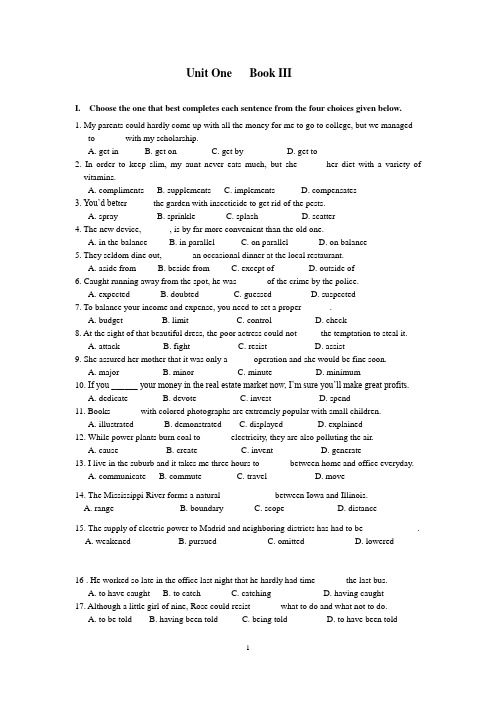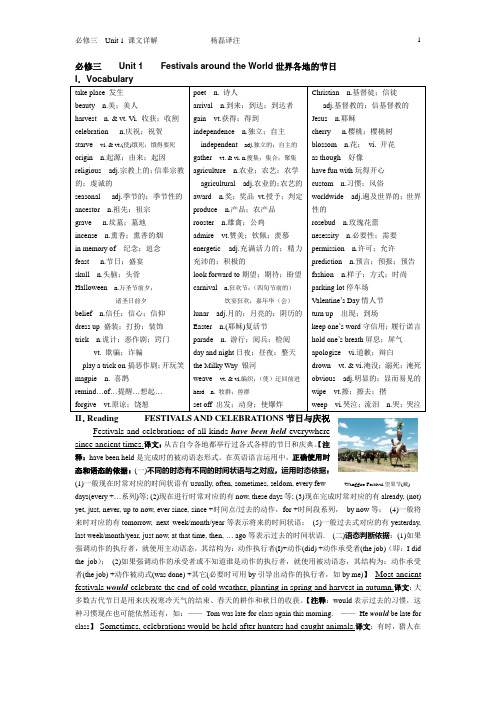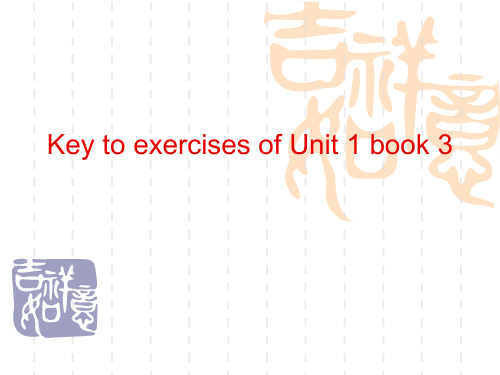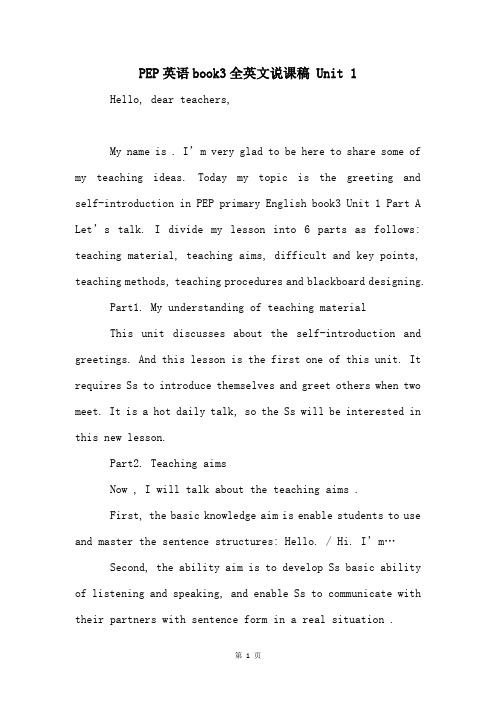Book III unit 1
新标准大学英语综合教程(第二版)Book3-Unit1课后答案

Unit 1Active Reading (1)4 1b 2 c 3c 4d 5c 6a51.attendance2.ambitious3.productive4.resistance5.script6.acceptance61 mortgage 2deck 3surf 4coastal; defy 5clamped 6criticized 7hauled 8prededing7 1b 2a 3b 4b 5b 6b 7a 8b 9bActive Reading (2)2。
1 c 2d 3b3 341 elapsed; cemetery2 rear; crammed 3triple 4budding;biography5finite 6dwellers 7invest 8skip 9inevitable51a 2b 3a 4a 5a 6b 7a 8a61a 2b 3b 4a 5a 6b 7b 8b 9aLanguage in use1·I’ve double- nd triple-checked it。
(compound verb)·budding crypt-kickers ((compound noun)·a rear-view mirror ((compound adjective)·the once-a-year holiday to Florida or Spain (compound adjective) ·back—burner stuff (compound adjective)·standing at the corner of the Co-op (compound noun)·a sepia—colored relative that no one can put a name to (compound adjective)21 a late-night party2 a well-stocked library3 a world-famous professor4 some well-timed advice5 a rapidly-growing population6 a free-market economy7 a half-hour boat trip31 It's how we behave that determines what other people think of us.2 It's what our character is that usually determines what sort of job we are going to end up doing。
Book3 unit1 Language points

【语境应用】完成句子。 1) 漂亮的寺庙和古老的市集是该镇的主要特色。
The town’s _m_a_i_n__fe_a_t_u_r_e_s are its beautiful temple and ancient marketplace. 2) Van Gogh画作的一个重要特色是色彩鲜亮。 A__n_i_m__p_o_r_ta_n_t__fe_a_t_u_r_e_o_f_ Van Gogh’s paintings __i_s__ their bright colors. 3) 大蒜是她餐食中很主要的特色。 Garlic _fe_a_t_u_r_e_s heavily in her cooking.
【语境应用】完成句子。 1) 她应该感谢Mike为她解决了这个难题。
She should ___b_e___ g_r_a_t_e_fu__l __t_h_a_t__ Mike has solved the problem for her. 2) 我非常感谢所有老师的帮助。 I __a_m____ __v_e_r_y__ g_r_a_t_e_f_u_l ___t_o___ all the teachers for their help.
【语境应用】 完成句子。 1) He’s writing a dictionary that explains the __o_r_ig_i_n__ of
words. 2) My job is to think up creative and _o_r_i_g_in_a_l_ advertising
【语境应用】 翻译句子。
1) It will take much time to figure out these math problems. 计算出这些数学题需要花很多时间。
Book 3 Unit 1课文答案和翻译

Unit 1, Book 3 The way to success Section A1.Understanding the text 略2.Critical thinking 略3. Words in use1.whereby2.pursuit3.inhibit4.maintain5.patriotic6.transcended7.endeavors8.dedication9.prestige10.nominate5.1.resultant2.tolerant3.pollutants4.inhabited5.contestants6.descendants7.attendants8.respectful9.participants10.neglectful11.resourceful12.boastful6. Banked cloze1. F2.G3.H4.J5. E6. A7.N8.I9.K10.M7. Expressions in use1.removed from2.failed in3.in the pursuit of4.deviated from5.precludes; from6.triumph over7.work their way into8.written off8. Structured writing 略9. Translation世界公民是指一个人承认自己是新兴的全球社区的一分子,而且其行动对全球社区的价值打造和实践活动有所贡献。
世界公民相信人类从本质上来说是一个整体,每个人都有改变事物的能力。
在我们这样一个相互依赖的世界中,世界公民意识鼓励我们认识到对彼此的责任,并从对方身上学习。
世界公民关心全球的教育、疾病、贫穷和环境问题,让他们拥有对全球社区的归属感。
这种不断发展的世界公民意识在很大程度上来讲,要归功于现代信息、通信和交通技术的力量。
世界公民意识致力于给予人们力量,让他们付诸行动。
Book3 Unit1 My father英语课文

Positive adjectives:
• easy-going • honest • open-minded • humorous • interesting • pleasant • pleasurable • frank • sympathetic • helpful • loyal • polite
• boastful
• vain
• greedy
• prejudiced
• cruel
• patronizing
• mean
• pretentious
• jealous
• hostile
• self-admiring
编辑ppt
Book 3-Unit 51
Neutral adjectives:
• complicated
Improving relations
• get along with
• compliment
• have a good or
• praise
friendly relationship with
•
appreciate one’s help/advice
• be on good terms with
• live happily with
• neighbors • alumnus (pl.
alumni) • alumna (pl.
alumnae) • relatives • comrade
编辑ppt
Book 3-Un1i5t 1
• employer—employee • superior—inferior/subordinate • teacher—student • doctor—patient • salesman—customer • host—guest • master—slave
大学英语综合(三) Unit1补充练习及答案

Unit One Book IIII. Choose the one that best completes each sentence from the four choices given below.1. My parents could hardly come up with all the money for me to go to college, but we managedto ______ with my scholarship.A. get inB. get onC. get byD. get to2. In order to keep slim, my aunt never eats much, but she _____ her diet with a variety of vitamins.A. complimentsB. supplementsC. implementsD. compensates3. You’d bet ter _____ the garden with insecticide to get rid of the pests.A. sprayB. sprinkleC. splashD. scatter4. The new device, ______, is by far more convenient than the old one.A. in the balanceB. in parallelC. on parallelD. on balance5. They seldom dine out, ______ an occasional dinner at the local restaurant.A. aside fromB. beside fromC. except ofD. outside of6. Caught running away from the spot, he was ______ of the crime by the police.A. expectedB. doubtedC. guessedD. suspected7. To balance your income and expense, you need to set a proper ______.A. budgetB. limitC. controlD. check8. At the sight of that beautiful dress, the poor actress could not_____ the temptation to steal it.A. attackB. fightC. resistD. assist9. She assured her mother that it was only a _____ operation and she would be fine soon.A. majorB. minorC. minuteD. minimum10. If you ______ your money in the real estate market now, I’m sure you’ll make great profits.A. dedicateB. devoteC. investD. spend11. Books ______ with colored photographs are extremely popular with small children.A. illustratedB. demonstratedC. displayedD. explained12. While power plants burn coal to ______ electricity, they are also polluting the air.A. causeB. createC. inventD. generate13. I live in the suburb and it takes me three hours to ______ between home and office everyday.A. communicateB. commuteC. travelD. move14. The Mississippi River forms a natural ____________between Iowa and Illinois.A. rangeB. boundaryC. scopeD. distance15. The supply of electric power to Madrid and neighboring districts has had to be ____________.A. weakenedB. pursuedC. omittedD. lowered16 . He worked so late in the office last night that he hardly had time ______ the last bus.A. to have caughtB. to catchC. catchingD. having caught17. Although a little girl of nine, Rose could resist ______ what to do and what not to do.A. to be toldB. having been toldC. being toldD. to have been toldII. Reading comprehensionPassage 1Telecommuting—substituting the computer from the trip to the job—has been hailed as a solution to all kinds of problems related to office work.For workers it promises freedom from the office, less time wasted in traffic, and help with child-care conflicts. For management, telecommuting helps keep high performers on board, minimizes tardiness(缓慢) and absenteeism(旷工, 缺勤) by eliminating commutes, allows periods of solitude for high-concentration tasks, and provides scheduling flexibility. In some areas, such as Southern California and Seattle, Washington, local governments are encouraging companies to start telecommuting programs in order to reduce rush-hour congestion(堵塞) and improve air quality.But these benefits do not come easily, Making a telecommuting program work requires careful planning and an understanding of the differences between telecommuting realities and popular imageMany workers are reduced by rosy illusions of life as a telecommuter. A computer programmer from New York City moves to the tranquil Adirondack Mountains and stays in contact with her office via computer. A manager comes in to his office three days a week and works at home the other two. An accountant stays home to care for her sick child; she hooks up her telephone mode connections and does office work between calls to the doctor.These are powerful images, but they are a limited reflection of reality. Telecommuting workers soon learn that it is almost impossible to concentrate on work and care for a young child at the same time. Before a certain age, young children cannot recognize, much less respect, the necessary boundaries between work and family. Additional child support is necessary if the parent is to get any work done.Management, too, must separate the myth from the reality. Although the media has paid a great deal of attention to telecommuting, in most cases it is the employee’s situation, not the availability of technology, that precipitates(使提前或突然发生) a telecommuting arrangement.That is partly why, despite the widespread press coverage, the number of companies with work-at-home programs or policy guidelines remains small.1. What is the main subject of the passage?A.Business management policies.B.Driving to work.C. Extending the workplace by means of computers.D. Computers for child-care purposes.2. What are the common problems for office employees?A.Being restricted to the office.B.Taking care of sick children.C.Driving in heavy traffic.D.All of them.3. Which of the following is NOT mentioned as a problem for employers that is potentiallysolved by telecommuting?A.Employees’ lateness for work.B.Employees’ absence from work.C. Employees’ need for time alone to work intensively.D. Employees’ conflicts with second jobs.4. What is the possible disadvantage of telecommuting?A.Small children cannot understand the boundaries of work and play.puter technology is not advanced enough to accommodate the needs of everysituation.C. Electrical malfunctions can destroy a project.D. The worker often does not have all the needed resources at home.5. Which of the following is an example of telecommuting as described in the passage?A. A scientist in a laboratory developing plans for a space station.B. A technical writer sending via computer documents created at home.C. A computer technician repairing an office computer network.D. A teacher directing computer-assisted learning in a private school.Passage 2Through a series of experiments an American scientist has obtained an understanding of the social structure of the most complex of ant societies. The ants examined are the only creatures other than man to have given up hunting and collecting for a completely agricultural way of life. In their underground nests they cultivate gardens on soil made from finely chopped leaves. This is a complex operation requiring considerable division of labour. The workers of this type of ant can be divided into four groups according to size. Each of the groups performs a particular set of jobs.The making and care of the gardens and the nursing of the young ants are done by the smallest workers. Slightly larger workers are responsible for chopping up leaves to make them suitable for use in the gardens and for cleaning the nest. A third group of still larger ants do the construction work and collect fresh leaves from outside the nest. The largest are the soldier ants, responsible for defending the nest.To find out how good the various size-groups are at different tasks, the scientist measured the amount of work done by the ants against the amount of energy they used. He examined first the gathering and carrying of leaves. He selected one of the size-groups, and then measured how efficiently these ants could find leaves and run back to the nest. Then he repeated the experiment for each of the other size-groups. In this way he could see whether any group could do the job more efficiently than the group normally undertaking it.The intermediate-sized ants that normally perform this task proved to be the most efficient for their energy costs, but when the scientist examined the whole set of jobs performed by each group of ants it appeared that some sizes of worker ants were not ideally suited to the particular jobs they performed.6. In what way are the ants different from other non-human societies?A. They do not need to search for food.B. They do not need to look for shelter.C. Individuals vary in social status.D. Individuals perform different functions.7. It seems that smaller ants perform more of the __________.A. construction tasksB. defensive workC. domestic tasksD. heavy work8. ―good‖ (Line 1,Para.3.)refers to ants’ _________.A. cooperation in workingB. sense of responsibilityC. efficiency in workingD. willingness to work hard9. The scientist’s work was based on __________.A.occasional observationsB.systematic observationsC.observations of several nestsD.observations of undisturbed nests10. The organization of the ants has the effect of ________.A.getting the most work doneB.dividing the work up systematicallyC.each ant helping with all the tasksD. each ant doing what it can do bestIII. Banked clozeI am one of the many city people who are always saying that given the choice we would prefer to live in the country away from the dirt and noise of a large city. I have managed to convince myself that if it weren’t for my job I would 1 head out for the open spaces and go back to nature in some sleepy village buried in the country. But how realistic is the dream ?Cities can be frightening places. The majority of the population live in massive tower blocks, noisy, dirty and impersonal. The sense of 2 to a community tends to disappear when you live fifteen floors up. All you can see from your window is sky, or other blocks of flats. Children become aggressive and nervous – cooped up at home all day, with nowhere to play ; their mothers feel 3 from the rest of the world. Strangely 4 , whereas in the past the inhabitants of one street all knew each other, nowadays people on the same floor in tower block don’t even say hello to each other.Country life, on the other hand, 5 from this kind of isolated existence in that a sense of community generally binds the inhabitants of small villages 6 . People have the advantage of knowing that there is always someone to turn to when they need 7 . But country life has disadvantages too. While it is 8 that you may be among friends in a village, it is also true you are cut off from the exciting and important events that take place in cities. There’s little possibility of going to a new show or the 9 movie. Shopping becomes a major problem, and for anything slightly out of the ordinary you have to go on an expedition to the nearest large town. The city-dweller who leaves for the country is often 10 by a sense of unbearable stillness and quiet.Key:I.1. C.2. B.3. A.4. D.5. A.6. D.7. A.8. C.9. B. 10. C.11. A. 12. D. 13. B. 14. B. 15.D.16. B. 17. C.II.1. C2. D3. D4. A5. B6. A7.C8. C9. B 10.DIII.1. E2. D3. G4. F5. J6. I7. K 8 . L 9. N 10. B。
(完整版)高中英语必修三-课文详解Book3-unit1

必修三Unit 1 Festivals around the World世界各地的节日take place 发生beauty n.美;美人harvest n. & vt. Vi. 收获;收割celebration n.庆祝;祝贺starve vi. & vt.(使)饿死;饿得要死origin n.起源;由来;起因religious adj.宗教上的;信奉宗教的;虔诚的seasonal adj.季节的;季节性的ancestor n.祖先;祖宗grave n.坟墓;墓地incense n.熏香;熏香的烟in memory of 纪念;追念feast n.节日;盛宴skull n.头脑;头骨Halloween n.万圣节前夕;诸圣日前夕belief n.信任;信心;信仰dress up 盛装;打扮;装饰trick n.诡计;恶作剧;窍门vt. 欺骗;诈骗play a trick on搞恶作剧;开玩笑magpie n. 喜鹊remind…of…提醒…想起…forgive vt.原谅;饶恕poet n. 诗人arrival n.到来;到达;到达者gain vt.获得;得到independence n.独立;自主independent adj.独立的;自主的gather vt. & vi. n.搜集;集合;聚集agriculture n.农业;农艺;农学agricultural adj.农业的;农艺的award n.奖;奖品vt.授予;判定produce n.产品;农产品rooster n.雄禽;公鸡admire vt.赞美;钦佩;羡慕energetic adj.充满活力的;精力充沛的;积极的look forward to期望;期待;盼望carnival n.狂欢节;(四旬节前的)饮宴狂欢;嘉年华(会)lunar adj.月的;月亮的;阴历的Easter n.(耶稣)复活节parade n. 游行;阅兵;检阅day and night日夜;昼夜;整天the Milky Way 银河weave vt. & vi.编织;(使)迂回前进herd n. 牧群;兽群set off 出发;动身;使爆炸Christian n.基督徒;信徒adj.基督教的;信基督教的Jesus n.耶稣cherry n.樱桃;樱桃树blossom n.花;vi. 开花as though 好像have fun with玩得开心custom n.习惯;风俗worldwide adj.遍及世界的;世界性的rosebud n.玫瑰花蕾nesessity n.必要性;需要permission n.许可;允许prediction n.预言;预报;预告fashion n.样子;方式;时尚parking lot停车场Valentine’s Day情人节turn up 出现;到场keep one’s word守信用;履行诺言hold one’s breath屏息;屏气apologize vi.道歉;辩白drown vt. & vi.淹没;溺死;淹死obvious adj.明显的;显而易见的wipe vt.擦;擦去;揩weep vi.哭泣;流泪n.哭;哭泣II.Reading FESTIV ALS AND CELEBRATIONS节日与庆祝Festivals and celebrations of all kinds have been held everywheresince ancient times.译文:从古自今各地都举行过各式各样的节日和庆典。
全新版大学英语第三册 Unit 1 课后习题答案

Hardships working hard both in winter and in summer harsh environment and weather condition anxious moments after the writer quit his job cutting back on daily expenses solitude
Байду номын сангаас
23. 怆然离去 leave with a feeling of sorrow 24. 自豪感 a sense of pride 25. 一旦形势好转 once economic conditions improve 26. 赚钱 earn money
The Countryside The countryside of Britain is well known for its beauty and many contrasts: its bare mountains and moorland, its lakes, rivers and woods, and its long, often wild coastline. Many of the most beautiful areas are national parks and are protected from development. When British people think of farmland, as well as open spaces, they imagine cows or sheep in green fields enclosed by hedges or stone walls, and fields of wheat and barley.
PEP英语book3全英文说课稿 Unit 1

PEP英语book3全英文说课稿 Unit 1Hello, dear teachers,My name is . I’m very glad to be here to share some of my teaching ideas. Today my topic is the greeting and self-introduction in PEP primary English book3 Unit 1 Part A Let’s talk. I divide my lesson into 6 parts as follows: teaching material, teaching aims, difficult and key points, teaching methods, teaching procedures and blackboard designing. Part1. My understanding of teaching materialThis unit discusses about the self-introduction and greetings. And this lesson is the first one of this unit. It requires Ss to introduce themselves and greet others when two meet. It is a hot daily talk, so the Ss will be interested in this new lesson.Part2. Teaching aimsNow , I will talk about the teaching aims .First, the basic knowledge aim is enable students to use and master the sentence structures: Hello. / Hi. I’m…Second, the ability aim is to develop Ss basic ability of listening and speaking, and enable Ss to communicate with their partners with sentence form in a real situation .Third, the emotion aim is to develop Ss’ consciousness of cooperation and competition and improve their interest of learning English.Part 3. Difficult and key points :Thirdly, I’d like to talk about the difficult and key points . The key point is that students can read and use the key sentences “I’m … / Hello. / Hi. ” in a real situation such as greeting people around them.The predicted point is the whole expression of self-introduction with “I’m…”Part4. Teaching methods :I’d like to analyze Ss and show you my teaching methods. In our school, Grade 1 is the first year to learn English. Ss are very curious about English. They’re active and competitive. Also, they are good at imitating. But, their attention can’t be kept long. So it requires us to use attractive teaching manners to hold Ss’ attention. Based on such a situation, I mainly use the task-based method, I’ve prepared activities such as TPR, singing, games, etc. I also arrange individual work, pair work and group work for Ss to practice. Besides, praise is very important. When they have a chance to speak, and have done a good job, they can geta star or something like that on their books. It’s very important to keep Ss’ in terests.Part5、Teaching procedure :I’ll finish this lesson in five steps.Step 1. Warm-up1. Enjoy a song “Hello”T: Hello, class. I’m Miss Xiao. You can call me “Miss Xiao”.(我叫肖老师,以后你们就可以叫我Miss Xiao)S: Hello, Miss Xiao.2. Free talkPresent a picture of the members in Cartoon Xi Yangyang and Hui Tailang. Ask Ss to tell the names one by one.T: Hello, boys and girls. Look, who are they?S: Xi Yangyang/ Mei Yangyang/…T: Do you like them? I like Mei Yangyang very much. Now, I’ll say hello to Mei Yangyang. Hello, Mei Yangyang. 小伴侣们,跟你们最喜爱的羊打招呼吧!S: I like…Purpose: Singing can easily take Ss into a free English environment. With the help of CAI, to present cartoon characters. Set a situation to help Ss say hello.Step2. Presentation1. Say hello to teacherT: 小伴侣,还记得老师的名字吗?接下来,老师要跟你们打招呼了。
- 1、下载文档前请自行甄别文档内容的完整性,平台不提供额外的编辑、内容补充、找答案等附加服务。
- 2、"仅部分预览"的文档,不可在线预览部分如存在完整性等问题,可反馈申请退款(可完整预览的文档不适用该条件!)。
- 3、如文档侵犯您的权益,请联系客服反馈,我们会尽快为您处理(人工客服工作时间:9:00-18:30)。
Page 4
Junk food
• the phrase was coined by Michael Jacobson in 1972. • the phrase conjures up images of hamburgers, pizzas, chips and sweets. • any food high in fat, salt or sugar. • Going healthy will help avoid several diseases. Proper nutrition is critical for good health, but identifying healthy food remains a challenge. Nowadays good healthy food has been replaced by the new food mantra – junk food!
Page 10
Structure of the text
1. (Para 1) Introduction: How I felt the first day on campus after my parents had left. 2. (Para 2-8) Mistakes I made on my first class day and my reaction 3. (Para 9) The mistake made by another college student and his reaction to it. 4. (Para 10-14) My thoughts on making mistakes.
•Pitifully, want nothing more than to find my way safely to dorm room, watching me, keep my ears open and my mouth shut, no one notice
Page 13
• What does “first-gradish”?
Page 16
• Distinctive的意思是“表示差别的”、“有特色的”、 “特殊的”(marking or showing a difference)。例如: • Can you find the distinctive watermarks of this stamp? • 你能找到这枚邮票上有明显的水纹吗? • Pupils in Hong Kong usually have distinctive badges on their school uniforms. • 在香港,小学生的校服上常戴有颇具特色的徽章。 • 现将distinct和distinctive用在一个句子里,以便区分: • One of the distinctive features of this book is its distinct illustrations. • 本书n food
• • • • • Sandwich, Hamburger Pizza Fish and chip Macaroni [͵mækə'rəuni] ͵ • • • • • 三明治 汉堡 比萨 鱼和薯条 通心面
• Spaghetti • steak
• 意大利细面条 • 牛排
Page 2
Preparation of Unit 1—phonetics training
Discreetly Reserve Anthology Grope Tip off Goody Puddle Ketchup Flail maneuver
Page 3
Rear Sandal Brigade Sneak Crunchy Spaghetti Clasp Slink Malicious shackle
Text Analysis
•
• • • • • • •
Autobiography Chronologically balanced pattern of narration Three incidents – sitting in the wrong class, – falling down in the cafeteria – witnessing the upper-class football player having the same experience Coupling narration with description the after-effect and the significant insight into herself.
Page 14
• The fact was that … I was feeling just a bit firstgradish. • The suffix –ish: • 1. Of, relating to, or being (the people or language of a particular country or place): Swedish, English • 2. Characteristic of; typical of or like a particular type of person: girlish. • 3. Having the usually undesirable qualities of(usu. disapproving): childish, snobbish, foolish, bookish • 4. Approximately; somewhat: greenish, reddish hair, youngish • 5. Tending toward; preoccupied with: selfish.
First-gradish: having the qualities and characteristics of a first-grade student. The first-gradish feeling is a mixture of helpless, disorientation, selfconsciousness, and a lack of confidence. 《红楼梦》黛玉初进贾府 红楼梦》 处处小心,时时在意,不敢轻易多说一句话, “处处小心,时时在意,不敢轻易多说一句话,多行一步 路”
Unit 1 Fresh Start
1. Topic discussion 2. Background information 3. Phonetics training 4. Structure of the text 5. Detailed study of the text 6. Homework
Page 9
• • • • • • •
用新的一页 新鲜的蔬菜/鱼/面包/空气 我重新再给你沏一壶茶吧。 新到的货 雨后植物看起来生气盎然。 她对办公室工作缺乏经验。 她想对我弟弟无礼。
新(鲜) 的;刚到的、刚发生的; 刚到的、刚发生的; 有活力的;无经验的; 年轻的 、有活力的;无经验的; 对异性)厚颜的, (对异性)厚颜的,无理的
Page 17
Paraphrase practice
Scanning, skimming, skipping and then answer the following questions.
1. What incidents did the author encounter in the beginning of her first year at college? 2. What is the type of writing? 3. What is the theme that the author intends to convey?
'mæn [ 'mȜntrǩ, 'm n-]: a commonly repeated word or phrase
Junk food
Obesity
Page 6
Slow in study
Junk food still has some nutrients and Children with a diet high in junk food is a small part of a balanced (均衡的) achieve lower test scores. diet (饮食). So you should eat healthy foods about 95% of the time, and then eat 5% of junk food.
Page 7
['siǩriǩl]
Page 8
meanings of “fresh”
• use a fresh page • fresh vegetable/ fish/ bread/ air • Let me make you a fresh pot of tea. • fresh goods • The plants look fresh after the rain. • She's quite fresh to office work. • She's trying to get fresh with my brother.
Page 15
• Why did the author have the impression that “everyone on campus was watching me.”?
Distinct的意思是“分明的”、“明了的”、“清楚的” (well-marked,clearly defined or easily discernible)。例: The photo you took in Hong Kong Cultural Centre is not distinct enough. 你在香港文化中心拍的那张照片不够清晰。 She has a distinct pronunciation. 她的发音清楚。 There is a distinct smell of smoke in my room. 我的房间里有一股明显的香烟味。 有时候,distinct还可用以表示“不同的”、“有区别的”意味。如: This picture is distinct from that. 这幅图和那幅不同。 The twins have distinct personalities. 这对双胞胎的个性并不相同。
